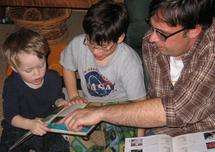Fathers are spending more hands-on time with their children than they were 30 years ago.
(PhysOrg.com) -- The time British parents spent on child care each day more than trebled between 1975 and 2000, Oxford research shows.
While mothers are still doing most of the work, fathers are catching up. British dads are spending almost 30 minutes a day longer on child care as well as more time doing the housework, DIY and shopping in 2000 than in 1975, according to the research.
The research, led by Dr Oriel Sullivan from the Department of Sociology at Oxford University, compared several thousand nationally representative time diaries from 1975 and 2000 kept by British parents with children under 18 in the household.
Dr Sullivan, who is also Deputy Director of the Centre for Time Use Research, divided the data she analysed into three groups: those without O levels or GCSEs; those with O levels or GCSEs, and those with higher qualifications. Her findings, based on diaries filled out by parents, show a number of trends:
• Fathers spent between three and eight minutes a day on average on child care in 1975 (depending on their educational achievement), and this rose to between 32 and 36 minutes in 2000.
• Mothers spent between eight and 21 minutes a day on average on child care in 1975 (depending on their educational achievement), and this rose to between 51 and 86 minutes in 2000.
• Fathers spent between 44 and 100 minutes a day on average on domestic duties in 1975 (depending on their educational achievement), and this rose to between 101 and 118 minutes in 2000.
• Mothers spent between 120 and 151 minutes a day on average on domestic duties in 1975 (depending on their educational achievement), and this rose to between 166 and 191 minutes in 2000.
Dr Sullivan said: ‘The last 50 years have seen a meaningful shift in the domestic division of labour across the countries of Western Europe and North America, with men contributing more both to housework and to child care.’
For fathers, the amount of time spent on domestic duties among those of different educational levels was more similar in 2000 than in 1975: those who left school without qualifications had ‘caught up’ with those with an education above GCSE/O levels.
For mothers, the biggest change was in the amount of time set aside for child care with mothers with an education above GCSE or O levels outstripping their less well-educated counterparts. In 2000, women with an education over GCSE or O level standard spent 86 minutes a day looking after their children, while those with just O levels and GCSEs spent 60 minutes and those without qualifications spent 51 minutes.
The research also looked at the figures from the US, finding that well-educated British couples had fallen behind their American equivalents in the time they spend looking after their children.
In the US, the amount of time men who were educated beyond high school spent with their children went up from 10 minutes a day in 1975 to 60 minutes in 2003. In the UK, men with an education beyond GCSEs and O Levels increased the time they spent from three minutes to 36 minutes in 2000.
The data used for the research is from the Multinational Time Use Study, which is central to the activities of the Centre for Time Use Research at Oxford University. It is a continually growing collection of national studies, harmonized for the purposes of comparative research and currently contains around 50 studies from 22 countries. The CTUR research also analysed data from the American Heritage Time Use Study which contains harmonised time use datasets from the United States from 1965-66 through to 2003.
Provided by Oxford University


















